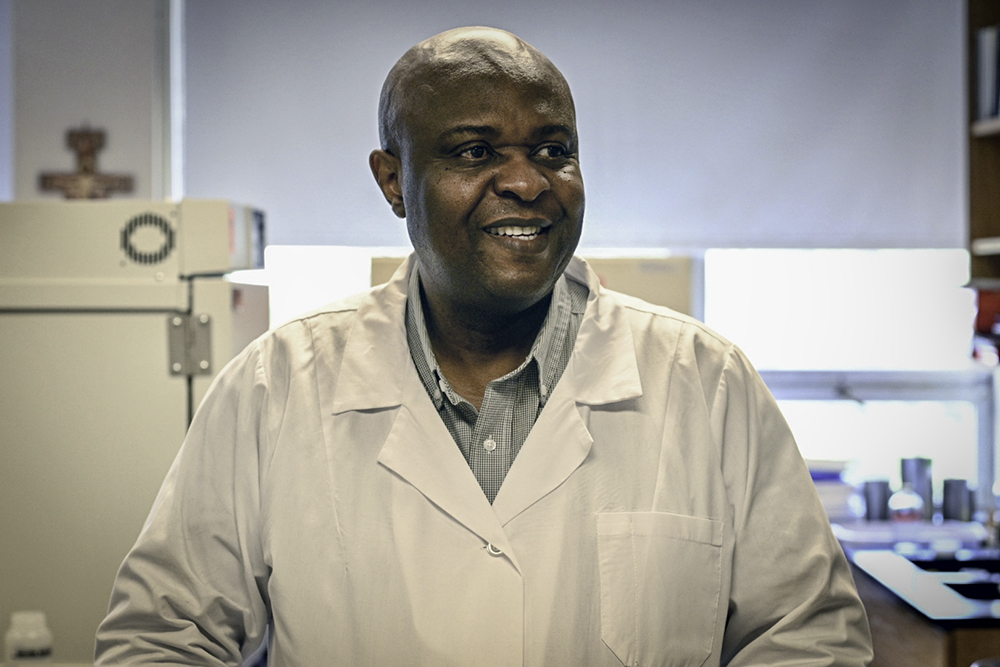
Jude Okoyeh, a new faculty member who teaches biology and clinical lab science, has a Ph.D. in pharmacology (clinical) with a specialization in malaria. Born in Nigeria, Okoyeh has seen this horrific disease shatter lives and destroy communities. He has set out on a mission to improve the development of a malaria vaccine.
“The enormous adverse impact on health made me go into this field. I witnessed a lot of deaths in children,” said Okoyeh. “I went into this to see how I can contribute to finding solutions to this big health problem.”
Malaria is a disease caused by a parasite. The parasite is transmitted to humans through the bite of infected female anopheles mosquitoes. People who have malaria usually feel very sick, with a high fever and shaking chills. In malaria endemic areas of the world, most of the people who die from the disease are young children with increased morbidity and mortality rates in pregnant women, non-immune travelers and other immunocompromised individuals.
The 2018 World Health Organization Report indicated that there were 219 million cases worldwide with 415,000 deaths. The malaria morbidity and mortality rates are still high, although recent control measures by different organizations have led to some reduction in malaria-associated deaths.
“Most of these deaths were children five years old and younger,” Okoyeh explained. “About 1,700 cases of malaria cases are diagnosed in the US each year.”
In 1996, Okoyeh successfully completed a postdoctoral fellowship with the United Nations Industrial Development Organization (UNIDO) at the International Center for Genetic Engineering and Biotechnology (ICGEB) in New Delhi, India. He researched molecular biology and malaria parasites. While in Nigeria, Okoyeh researched new drugs to treat malaria and studied the resistance of numerous drugs used to treat the disease.
According to Okoyeh, there are five different types of malaria parasites that infect people and they undergo three different stages of development - in the liver, in the blood, and in the mosquito. From 1996 to 1999, Okoyeh focused his research on finding possible malaria proteins that can be targeted in developing a vaccination for the blood stage.
Researchers in the field were looking to develop vaccines using antigens from laboratory-adapted malaria parasites but during Okoyeh’s postdoctoral research, he used field isolates (parasites) that were obtained directly from infected patients.
“Lab samples would lose their originalities and characteristic invasion profiles compared with fresh samples from patients,” he explained.
Okoyeh found that the malaria parasites would find a way to go around the initial vaccine targets and that was the reasons those vaccines were not very effective in protecting patients from infection. His research provided proof that malaria parasites can use alternative pathways to invade the red blood cells of infected patients.
Okoyeh’s publications and seminar presentations about his findings caused researchers to rethink and reevaluate their strategies as well as the malaria parasite antigens being used as possible targets for a blood-stage malaria vaccine. Presently, no effective malaria vaccine is available against the red blood-stage cycle of this parasite.
“In April 2019, a malaria vaccine called RTS, S that provides partial protection in young children against Plasmodium falciparum (the deadliest form of the malaria parasites) was launched in Malawi by GlaxoSmithKline. This is the first malaria vaccine in the world to provide partial protection in young children. The vaccine works by triggering the immune system to block the parasites from invading the liver cells when the person is infected by plasmodium falciparum parasites after a mosquito bite. It is administered in four separate doses. Currently, the RTS, S, is undergoing further clinical trials in some African countries,” Okoyeh said.
 CHALLENGE
CHALLENGE





